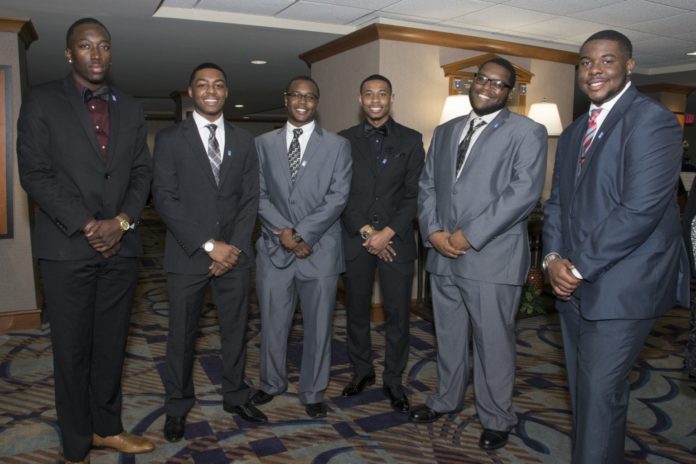Each year, more African-American men are entering college, but reports show that only half of them are finishing. At the University of Memphis those numbers hit close to home with the graduation rate of African-American men standing at less than 11 percent.
The Hooks African American Male Initiative (HAAMI), an organization founded on the campus of U of M, is attempting to combat the unfavorable statistics by providing African-American male students with resources that will help them defy the odds and walk across the stage. This month they kicked off the start of the new school year with interest meetings to enroll more students into the program.
“Research has shown that if students have access to support services and mentors it helps improve graduation rates,” Rorie Trammel, assistant director of the Benjamin L. Hooks Institute for Social Change and HAAMI coordinator said.
HAAMI was founded in 2015 to provide its members with peer mentoring, training and other resources that leaders hope will increase the retention and graduation rates among its black male students.
“I will be the first male in my family to graduate college,” Christian Craine, a U of M student and HAAMI member said. “This program has been the support system I’ve needed because I haven’t had any males in my family to serve as role models when it comes to college.”
Understanding the need for positive representations from other African-American men, mentorship has served as one of the key focuses of the organization. Monthly empowerment sessions and training workshops allow students to interact with African-American male professionals across the country.
“Being able to speak to different mentors helps me figure out what I’d like to do after graduation,” Kerry Johnson, another HAAMI member said. “This helps us build better relationships and pushes us to think about our future.” Johnson added that seeing successful African-American men not only provides inspiration, but affirmation.
“Black men are usually not affirmed in college and usually end up going back to what affirms them, which may be negative environments in some cases,” he said. “Through HAAMI we learn that we don’t have to change our identity or conform to be successful.”
HAAMI member, Matthew Moore, agreed, alluding to the scarcity of other African-American male students in his class and the stereotypes that are usually attached to them.
“I’ve been told by advisors that I should possibly choose another major that is less demanding,” he recalled. “There is a negative stereotype associated with black men that says we aren’t intelligent enough and we will try to take the easy way out.”
“It’s difficult for black men in college because there usually isn’t a clear pipeline to assist us with success,” David A Rose II, a recent U of M graduate, suggested. “Once you get a community of brothers on the same team like here at HAAMI, it helps with accountability and building each other up.”
Besides the camaraderie of brotherhood, Rose said one of the most important things that HAAMI offers is knowledge in financial literacy. Recalling his struggles as a college student with student loans and unforeseen medical emergencies, Rose said he learned the hard way what it means to be financially illiterate.
“At one time I had Sallie Mae loans and medical loans to pay. I lost my scholarships because I had to take time off when I had heart surgery,” he said. “I was in a lot of debt and didn’t know how I would get out of it.”
Rose, who now works as a program services specialist for HAAMI, said he’s still learning while working with students. He credited his college degree for landing his role in the organization and other opportunities he’s acquired since graduation.
“A college degree is documentation that shows an employer that you are dedicated and that you know how to learn,” Rose said.
Unfortunately, many African-American men aren’t able to provide that documentation to potential companies, giving up on college due to a variety of factors. The problem isn’t specific to Memphis. Research shows that there has been an approximate 90 percent increase of African-American males enrolled in college since 2000; but the graduation rate is less than half of that.
“I’ve seen a lot of my friends leave college after the first year,” Johnson recalled. “That’s been one of the most difficult parts of my experience at U of M.”
Johnson said that if some of his former peers had the opportunity to join HAAMI before dropping out, they may have reconsidered.
“This organization is definitely impacting the lives of black males on campus,” he said.
Despite the growth academically and socially through their time with HAAMI, members said it’s bigger than just their own success. Moore wants his influence to even reach outside of his family.
“You need the degree to make a greater impact. I want to build something that impacts people in greater numbers. I want to have something that when I’m gone people in my family or neighborhood can pick up the mantle and continue it.”
For Craine, who will be the first male in his family to graduate college, it’s about breaking a generational curse.
“I know graduating will mean a lot to my family. And my younger family members will be able to see a positive role model and begin thinking about pursuing a college degree. That’s what matters the most to me.”
(HAAMI will host its next information session and orientation on Friday, September 29 at 12:30 p.m. at the University Center at The University of Memphis. For more information, contact Rorie Trammel at 901-678-3655, or [email protected].)




